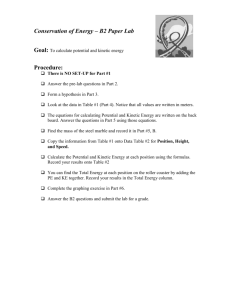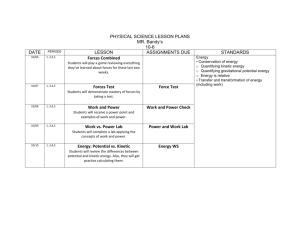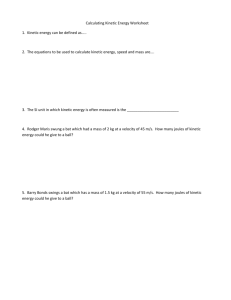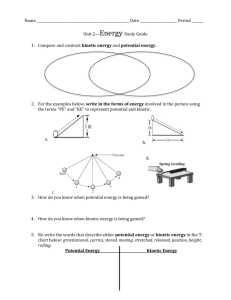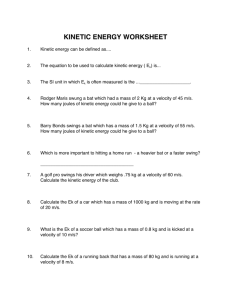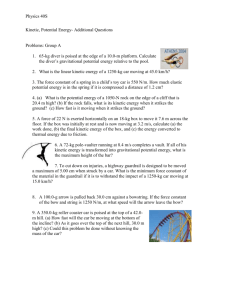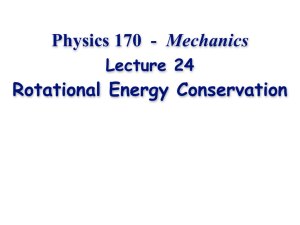Work, Power and Energy Worksheet
advertisement
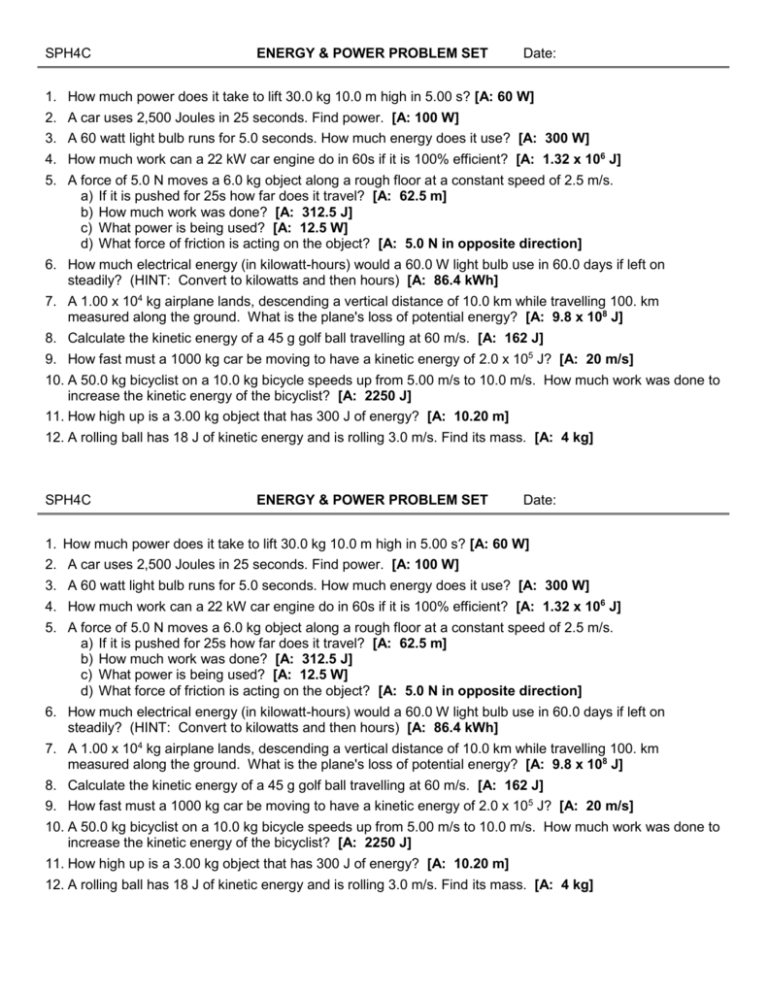
SPH4C ENERGY & POWER PROBLEM SET Date: 1. How much power does it take to lift 30.0 kg 10.0 m high in 5.00 s? [A: 60 W] 2. A car uses 2,500 Joules in 25 seconds. Find power. [A: 100 W] 3. A 60 watt light bulb runs for 5.0 seconds. How much energy does it use? [A: 300 W] 4. How much work can a 22 kW car engine do in 60s if it is 100% efficient? [A: 1.32 x 106 J] 5. A force of 5.0 N moves a 6.0 kg object along a rough floor at a constant speed of 2.5 m/s. a) If it is pushed for 25s how far does it travel? [A: 62.5 m] b) How much work was done? [A: 312.5 J] c) What power is being used? [A: 12.5 W] d) What force of friction is acting on the object? [A: 5.0 N in opposite direction] 6. How much electrical energy (in kilowatt-hours) would a 60.0 W light bulb use in 60.0 days if left on steadily? (HINT: Convert to kilowatts and then hours) [A: 86.4 kWh] 7. A 1.00 x 104 kg airplane lands, descending a vertical distance of 10.0 km while travelling 100. km measured along the ground. What is the plane's loss of potential energy? [A: 9.8 x 108 J] 8. Calculate the kinetic energy of a 45 g golf ball travelling at 60 m/s. [A: 162 J] 9. How fast must a 1000 kg car be moving to have a kinetic energy of 2.0 x 105 J? [A: 20 m/s] 10. A 50.0 kg bicyclist on a 10.0 kg bicycle speeds up from 5.00 m/s to 10.0 m/s. How much work was done to increase the kinetic energy of the bicyclist? [A: 2250 J] 11. How high up is a 3.00 kg object that has 300 J of energy? [A: 10.20 m] 12. A rolling ball has 18 J of kinetic energy and is rolling 3.0 m/s. Find its mass. [A: 4 kg] SPH4C ENERGY & POWER PROBLEM SET Date: 1. How much power does it take to lift 30.0 kg 10.0 m high in 5.00 s? [A: 60 W] 2. A car uses 2,500 Joules in 25 seconds. Find power. [A: 100 W] 3. A 60 watt light bulb runs for 5.0 seconds. How much energy does it use? [A: 300 W] 4. How much work can a 22 kW car engine do in 60s if it is 100% efficient? [A: 1.32 x 106 J] 5. A force of 5.0 N moves a 6.0 kg object along a rough floor at a constant speed of 2.5 m/s. a) If it is pushed for 25s how far does it travel? [A: 62.5 m] b) How much work was done? [A: 312.5 J] c) What power is being used? [A: 12.5 W] d) What force of friction is acting on the object? [A: 5.0 N in opposite direction] 6. How much electrical energy (in kilowatt-hours) would a 60.0 W light bulb use in 60.0 days if left on steadily? (HINT: Convert to kilowatts and then hours) [A: 86.4 kWh] 7. A 1.00 x 104 kg airplane lands, descending a vertical distance of 10.0 km while travelling 100. km measured along the ground. What is the plane's loss of potential energy? [A: 9.8 x 108 J] 8. Calculate the kinetic energy of a 45 g golf ball travelling at 60 m/s. [A: 162 J] 9. How fast must a 1000 kg car be moving to have a kinetic energy of 2.0 x 105 J? [A: 20 m/s] 10. A 50.0 kg bicyclist on a 10.0 kg bicycle speeds up from 5.00 m/s to 10.0 m/s. How much work was done to increase the kinetic energy of the bicyclist? [A: 2250 J] 11. How high up is a 3.00 kg object that has 300 J of energy? [A: 10.20 m] 12. A rolling ball has 18 J of kinetic energy and is rolling 3.0 m/s. Find its mass. [A: 4 kg]
